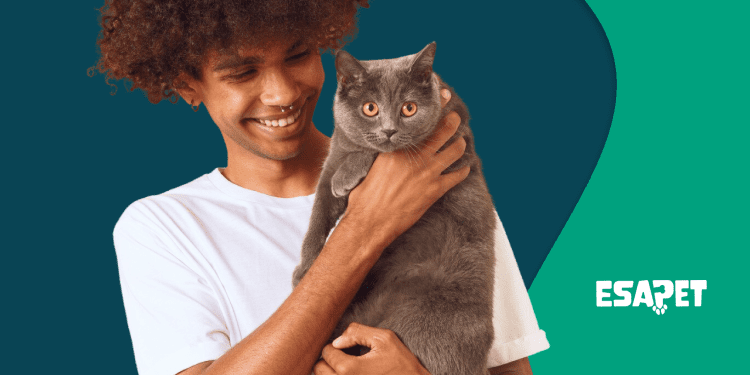Do Cats Help with Anxiety? Benefits Backed by Science

Anxiety is a common mental health challenge that affects millions of people worldwide, often impacting daily life and overall well-being. While there are many treatments available, including therapy and medication, many individuals also turn to the comforting presence of pets for emotional support.
Among these, cats have become popular companions for their calming influence and unique ability to provide comfort. But do cats really help with anxiety? This article explores the ways cats can support mental health, and how they may offer meaningful relief through companionship, routine, and emotional connection.
Cats and Mental Health
Cats can play a meaningful role in supporting mental health, particularly when recognized as Emotional Support Animals (ESAs). Their presence offers a variety of therapeutic benefits that assist individuals in managing mental health challenges such as anxiety, depression, and Post-Traumatic Stress Disorder (PTSD).
Are Cats Good for Mental Health?
Yes. Scientific studies indicate that cats can have a calming effect on their owners. Interaction with cats has been shown to reduce cortisol levels—the hormone associated with stress—and help lower blood pressure. Beyond the physiological benefits, cats provide emotional comfort, alleviate feelings of loneliness, and contribute positively to easing symptoms of anxiety and depression.
Impact on Mental Health Symptoms
Studies have indicated that cat ownership is associated with lower levels of depressive symptoms and improved mood. For instance, a 2017 study found that cat owners reported significantly lower feelings of depression compared to dog owners. This suggests that the bond between cats and their owners can have a positive impact on mental health.
Can Cats Help With Anxiety?
Yes, absolutely. Cats provide consistent companionship and affection, which can be grounding during anxious episodes. Their routines and behaviors offer comfort and predictability — key for people with anxiety disorders.
Why Do Cats Help With Anxiety?
- They offer unconditional affection.
- They promote mindfulness. Petting a cat is a repetitive, soothing action that can calm the nervous system.
- They reduce loneliness. Even silent companionship helps people feel seen and needed.
- They help establish routines. Feeding, playing, and caring for a cat adds structure to the day.
How Do Cats Help With Anxiety?
- Sit beside you during panic attacks
- Encourage you to slow down and focus on the present
- Distract you from intrusive thoughts
- Regulate your emotional state through quiet presence
Do Cats Help With Depression and Anxiety?
Yes, cats can play a significant role in alleviating symptoms of depression and anxiety. While they are not a substitute for professional therapy or medication, their presence offers therapeutic benefits that can complement traditional treatments.
Cat as an Emotional Support Animal
Cats can be highly beneficial as Emotional Support Animals (ESAs), offering significant comfort and support for individuals dealing with various mental health conditions such as anxiety, depression, and PTSD.
An ESA is defined as an animal that provides emotional support that alleviates one or more identified symptoms or effects of a person’s disability through its comforting presence, without needing to be trained to perform specific tasks.
How to Make Your Cat an Emotional Support Animal?
To legally recognize your cat as an ESA, you’ll need an ESA letter from a licensed mental health professional. The process is simple and can often be done online — but be cautious with scams.
Get an ESA Letter for Your Cat
An ESA letter must:
- Be written by a licensed therapist, psychologist, or psychiatrist
- Be on official letterhead
- State that you have a qualifying mental health condition (e.g., anxiety, PTSD)
- Explain how the cat helps alleviate symptoms
This letter allows you to live with your cat in no-pet housing under the Fair Housing Act (FHA), and avoid pet fees in many cases.
Get your Official ESA Letter Consultation from a licensed therapist.
Get ESA Letter NowCan Cats Be Therapy Animals?
Yes, cats can be therapy animals, often called Pets as Therapy (PAT) animals. Therapy animals are used for short-term therapeutic interventions to help reduce stress and promote calmness. They usually provide comfort and companionship in clinical settings such as care homes, schools, and hospitals, under the supervision of their owner—who is not the person receiving therapy.
Therapy cats can help alleviate loneliness and support individuals dealing with depression, anxiety, and certain phobias by improving physical, social, emotional, and cognitive well-being through their presence.
Therapy Cat vs Emotional Support Cat: What’s the Difference?
It’s important to clearly differentiate between therapy animals and emotional support animals (ESAs), as they serve different purposes and have different legal statuses.
| Aspect | Therapy Cat | Emotional Support Cat |
|---|---|---|
| Purpose | Provide comfort and emotional support to many people in clinical or institutional settings | Provide continuous emotional support to their owner with a diagnosed mental health condition |
| Typical Environment | Hospitals, nursing homes, schools, counseling centers | Lives with the owner, supports daily life at home and beyond |
| Ownership | Usually owned and handled by volunteers or professionals, not by therapy recipients | Owned by the individual with a mental health diagnosis |
| Training Required | No specialized task training required | No specialized task training required |
| Legal Protections | Not granted public access rights under ADA | Not protected under ADA or similar laws for public access |
| Access to Public Spaces | Limited to therapy visits in controlled environments | No guaranteed access to public spaces like service animals |
6 Benefits of Having a Cat for Mental Health
Here are 6 main benefits of having a cat:
- Lower stress and anxiety levels
- Improved sleep and mood
- Reduced loneliness
- Increased sense of purpose
- A soothing daily routine
- Comfort during panic attacks or depressive episodes
1.Lower Stress and Anxiety Levels
Research shows that interacting with pets, including cats, can significantly reduce cortisol levels (the hormone related to stress) and increase oxytocin and serotonin, hormones that promote relaxation and happiness.
A 2019 study published in Frontiers in Psychology found that petting a cat or dog lowers blood pressure and heart rate, helping to alleviate anxiety symptoms and promote calmness.
2. Improved Sleep and Mood
Studies indicate that the companionship of pets can improve sleep quality. According to research from the Mayo Clinic, the presence of a pet can provide comfort and security that helps reduce insomnia.
Additionally, a 2018 survey published in BMC Psychiatry highlighted that pet owners reported lower levels of depression and improved mood compared to non-pet owners.
3. Reduced Loneliness
Loneliness is a significant risk factor for mental health disorders, and pets can serve as social companions. A 2017 study in the Journal of Social Psychology showed that pet owners, especially those with cats or dogs, experienced lower feelings of loneliness and social isolation, which is crucial for emotional well-being.
4. Increased Sense of Purpose
Taking care of a pet requires routine and responsibility, which can provide structure and meaning. Research published in Aging & Mental Health (2015) found that pet ownership was linked to greater life satisfaction and a sense of purpose, especially among individuals coping with depression or anxiety.
5. A Soothing Daily Routine
Maintaining a daily routine by caring for a cat helps individuals establish consistent habits. According to The Gerontologist (2016), having predictable routines reduces anxiety and fosters emotional stability, especially in people with mental health conditions.
6. Comfort During Panic Attacks or Depressive Episodes
Cats’ intuitive behavior to their owners’ emotional states can provide immediate comfort during crises. A study published in PLoS ONE (2019) revealed that pet interactions reduce negative moods and physiological stress responses, helping to mitigate panic attacks and depressive episodes.
FAQs About Cats Assisting With Anxiety
If you love animals and can commit to their care, a cat can be a wonderful support for anxiety.
Many cat owners report that their pets behave differently when they’re stressed. Cats can pick up on body language, tone of voice, and changes in routine.
Yes. While it’s not a cure, many people find that the affection, responsibility, and routine of caring for a cat help reduce depressive symptoms.
That depends on your lifestyle. Cats are low-maintenance compared to dogs and offer calm, steady companionship—perfect for people who need quiet and emotional balance.
Unlock the Full Benefits by Getting an ESA Letter
Cats are more than cute companions—they can offer real emotional relief to people struggling with anxiety and depression. Whether you decide to adopt a cat or register your current feline as an emotional support animal, the comfort they bring is undeniable.
If you’re ready to take the next step, consider speaking to a licensed therapist about getting an ESA letter for your cat and unlocking housing protections and more.

ESA and Service Animal Rights, Emotional Support Animal
ESA Forms & Letters: Everything You...
Jonalyn Dionio
Jan 22 2026

Emotional Support Animal, Emotional Support Animal Types and Breeds
Emotional Support Rabbits as Emotional S...
Julia Oliveira
Jan 22 2026






